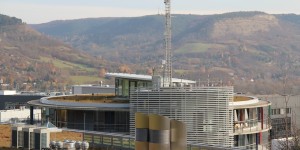Top Qs
Timeline
Chat
Perspective
Max Planck Institute for Biogeochemistry
Institute in the Max Planck Society located in Jena, Germany From Wikipedia, the free encyclopedia
Remove ads
The Max Planck Institute for Biogeochemistry is located in Jena, Germany. It was created in 1997, and moved into new buildings 2002.[1] It is one of 84 institutes in the Max Planck Society (Max Planck Gesellschaft).[2]
This article includes a list of general references, but it lacks sufficient corresponding inline citations. (February 2013) |


Scientific profile
The research at the Max Planck Institute for Biogeochemistry is dedicated to the study of global biogeochemical cycles and their long-term interactions with the biosphere, the atmosphere, the geosphere and the entire climate system.[3]
50°54′38″N 11°34′2″E
Remove ads
Departments and research groups
The institute has three departments, with each department consisting of several research groups, and sometimes additional project groups.[4]
References
External links
Wikiwand - on
Seamless Wikipedia browsing. On steroids.
Remove ads
